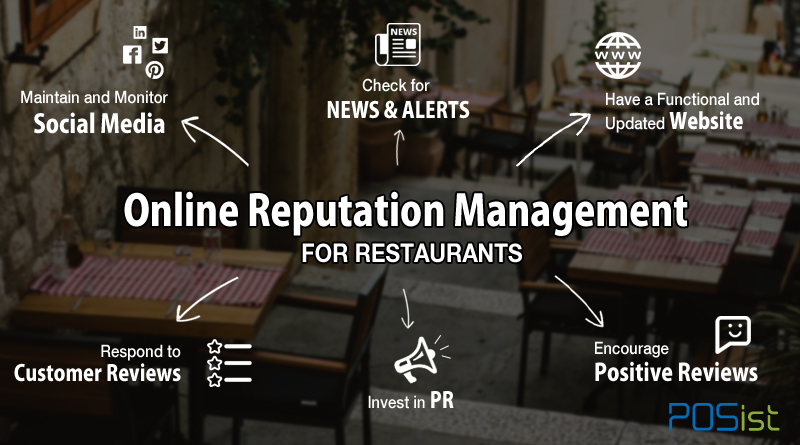In this globalized digital world, there are no barriers between the restaurants and its customers. The first thing that all of us do before trying out a new restaurant is Google it. The first few links are enough to give us a picture of the place, food, ambiance, and service. The online ratings and reviews play a significant role in attracting customers to the restaurant. According to a study, 97% of consumers looked for a local business (such as a restaurant) online. Thus, Online Restaurant Reputation Management becomes essential to growing your business and should be included in your restaurant’s marketing plan. Read a detailed guide on restaurant marketing here.
The Importance of Online Restaurant Reputation Management and How to Do It Right
In this article, we will discuss the main things you should take care of your online restaurant reputation management.
1. Maintain and Monitor Social Media Presence
Restaurants should focus on creating their presence on all possible social media platforms such as Facebook, Twitter, Instagram. Not only this, it is essential to keep the social media pages updated. So, if you haven’t already, create a page on Facebook. Read a detailed guide on how to make the best use of Facebook for your restaurant here.
Customers often take to Facebook and Twitter to share their review of their experience. Encourage customers to review and rate your Facebook page and leave a positive comment. This helps in restaurant reputation management.
There are several active Food Groups on Facebook, where the foodies often share their experience of going to a restaurant. It is a good idea to monitor the conversations happening in these groups. Staying on the lookout if anyone is talking about your restaurant—positive or negative is an essential part of online restaurant reputation management.
2. Respond to Customer Reviews
How well you respond to the customer’s reviews’ irrespective of whether it is good or bad speaks a lot about your restaurant. While a good review should be acknowledged and the customer should be appreciated for his/her time and effort, extra care must be taken while addressing a negative review. You must remember that when you are responding to one particular bad review, you are posting a message that any customer, present or future, can see. It is always better to apologize and admit your mistake and promise guests a better experience in the future. However, there may be times when a customer posts a bad review in the hope of getting a discount coupon or just out of malice. You should maintain your calm in such a situation and present your side of the story professionally.
Find out what to do when your restaurant gets a bad customer review.
3. Encourage Positive Reviews
It is common practice for customers to go through the restaurant’s reviews before dining or ordering from there. Customer reviews act as proof of the social acceptance of that restaurant, which also helps in enhancing your customer base. Therefore, happy and satisfied customers should be acknowledged and encouraged to leave favorable reviews and appreciated for their feedback. Engagement on your business’s online pages is critical. Fresh, recent reviews are vital to a strong online restaurant reputation. Invest time in restaurant review management, this will help you maintain a great online reputation.
4. Check for News and Alerts
Keep your eyes and ears open to any news or discussions happening about your restaurant. One way to do this is to subscribe to Google Alerts. In case there is any PR (positive or negative) happening about your restaurant, you’d get an automatic alert in your Gmail updates section.
Your brand isn’t what you say it is, it’s what Google says it is.- Chris Anderson
It is also a good idea to do random Google search checks. Just type in your restaurant’s name and see what comes up. Go through the links and check for any negative reports. Also, ensure that the information provided on your Google listing is complete, along with the correct address, timing, etc.
5. Invest in PR
Investing in Public Relations can help you a lot in online restaurant reputation management. The reach of media coverage in a credible online newspaper or magazine can significantly impact your customer base. However, PR can be expensive and is not feasible for all restaurants. You can also engage with Food Bloggers with an excellent online readership. Check the Alexa rank of their blogging website and the number of daily visits they get on their blog. PR help in restaurant reputation management.
6. Have a Functional and Updated Website
Your restaurant’s website plays a vital role in online reputation management of restaurants. A restaurant’s official website is the most authentic source of information. You have the full discretion to decide how your website will look like and what goes in it. Your website should be in a proper place with all the required information like Location, Hours of operation, Menu, Price Range, Wi-fi, Parking, etc. as it not only represents your firm online but also helps increase the customer base by providing them information about the restaurant. This is the place you can tell your restaurant’s story, and build a connection with your customers.
Any restaurant whether a chain or independent stands to gain drastically by engaging in a proactive reputation management process. Every restaurant should prioritize to respond to the online reputation management problems as they arise to prevent them from becoming more significant problems. How you do the online restaurant reputation management is a realistic reflection of the care and hard work you put into your business.

















